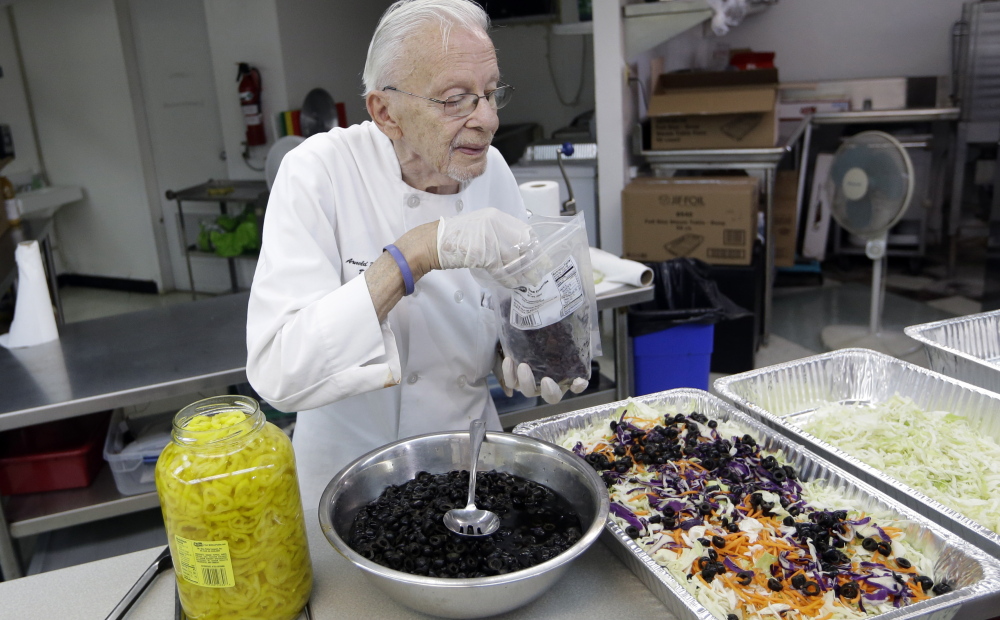FORT LAUDERDALE, Fla. — At the age of 90, Arnold Abbott could be enjoying a quiet retirement, reflecting on his combat service in World War II, writing poetry, or even polishing the sequel to his self-published book, “From Aches To Ecstasy: A Sex Primer For Those Over Fifty.”
Instead, the longtime Fort Lauderdale resident is dealing with the demands of celebrity after his insistence on feeding the homeless in defiance of a new city ordinance has thrust him into an international spotlight.
“I’ve had calls from Moscow and Syria. The phone is ringing every 15 seconds,” he said this week from the kitchen of his home, a day after police for the second time charged him with violating a new law aimed at the public feeding program he has run since 1991.
“The support has been unbelievable. I am both humbled and exalted by it.”
Among those who are less-than-exalted are those tasked with promoting the city’s image as a tourist destination.
“It is reading badly,” said Nicki Grossman, president of the Greater Fort Lauderdale Convention & Visitors Bureau. “It is not pleasant getting emails from people saying we’re not coming to your city because you have no heart.”
Grossman said that although it is too early to tell what long-term effect the publicity may have, she has urged city Mayor Jack Seiler and the commission to counter the onslaught of bad press. “I told them to take these emails to heart, to communicate back to these individuals,” she said. “The accurate story isn’t being told.”
Seiler responded Thursday with a detailed press release in which he said the city “is not banning groups from feeding the homeless. We have established an outdoor food distribution ordinance to ensure the health, safety and welfare of our community.”
The ordinance, passed Oct. 22, “regulates the activity in order to ensure it is carried out in an appropriate, organized, clean and healthy manner” and “permits indoor food distribution to take place at houses of worship throughout the city,” Seiler said.
Abbott, a former jewelry manufacturer, has been in the news before. In 2002 he successfully sued the city to block an earlier effort to shut down the food distribution his nonprofit group Love Thy Neighbor conducted at a beachfront city park.
In 2013 he was named winner of the For Good Awards by the Community Foundation of Broward.
But nothing compares to the explosion of media attention that poured in from around the globe last week after police cited Abbott for violating the new law on two different occasions. The ordinance limits where outdoor feeding sites can be located, requires permits and says the groups must provide portable toilets, hand-washing stations and maintain the food at precisely prescribed temperatures.
In part, Abbott said, some of the attention stems from his age. “I’m 90,” he said. “That’s a big number.”
He was first cited for violating Ordinance C-14-42 on Nov. 2 at Stranahan Park. As he and other volunteers began dishing out plates of hot food, Abbott said, “A policeman pulled my arm and said, ‘Drop that plate right now.’ Like it was a gun.”
He was cited again Wednesday in South Beach Park, this time after police stood by and watched him for 45 minutes as he served up chicken stew and cheesy potatoes to about 100 homeless men and women.
Abbott is not the only one who regularly feeds the homeless in Fort Lauderdale, but his twice-weekly operation is perhaps the most visible. And he thinks the measure was crafted with him in mind.
“The city mayor and the commission are puppets of the mega-rich who live in Fort Lauderdale, and they want to get rid of the homeless,” Abbott said. “There are others out there who feed people on the street, but the city can scare them. I think this law is primarily aimed at us.”
Abbott and his supporters say they are scrupulous about safety and cleanliness.
And, said Abbott, his organization does more than just feed people.
“More importantly I educate the homeless,” he said, chiefly through a cooking school he founded in connection with McFatter Technical Center. Since its start in 2003, he said more than 400 people had completed the nine-week program.
Copy the Story LinkSend questions/comments to the editors.



Success. Please wait for the page to reload. If the page does not reload within 5 seconds, please refresh the page.
Enter your email and password to access comments.
Hi, to comment on stories you must . This profile is in addition to your subscription and website login.
Already have a commenting profile? .
Invalid username/password.
Please check your email to confirm and complete your registration.
Only subscribers are eligible to post comments. Please subscribe or login first for digital access. Here’s why.
Use the form below to reset your password. When you've submitted your account email, we will send an email with a reset code.